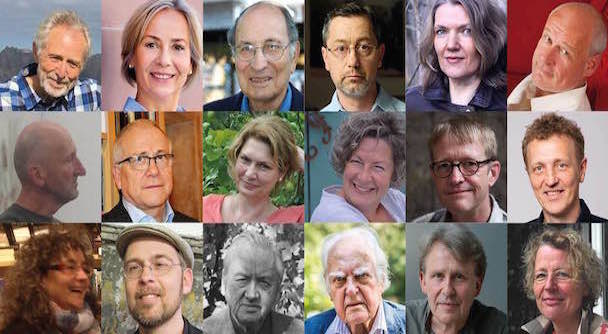Authors & Books
Guest of Honour Slovenia 2023
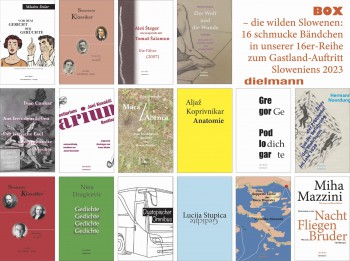
Slovenia, with its rich and special literature, is the Guest of Honour at Frankfurt Book Fair in October 2023. From 2020, this was be the background to our intensive research, readings and travels through Slovenia and its book worlds.
We are most greatful to Slovenian Book Agency JAK (Javna agencija za knjigo republike Slovenije) to support us. Especially to give emphasize to our Projects towards Slovenian Literature with their kind Letter of Intent.
We have received considerable support from Matthias Göritz and Erwin Köstler, who have pointed out many authors and made many works accessible to us. They have done a great job as editors and translators in creating the »BOX—the wild Slovenes« with (initially) 16 volumes of our series »16ers«. Many thanks for that—and you can read more about it below!
We were surprised that there was no book worth mentioning in German about the wonderful wines and the stubborn winegrowers of Slovenia. Then we tackled it: Wine and Vintners in Slovenia. And we are as happy about it as we are about the many contacts to the great winemakers in the country. Rating: Worth discovering!
Finally, a very special book of stories: »Teufelssprache« (Devil's Language) by the Ljubljana-based author Veronika Simoniti, translated by Tamara Kerschbaumer. A book that immediately transports you to the land of Slovenia, full of idiosyncratic characters from Slovenian history and lands beyond the scarce Adriatic coastline. Immerse yourself immediately!
More to come. Definitely!
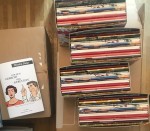
BOX—the wild Slovenes
- a BOX
- with 16 volumes from our series »the 16ers«
- to welcome Slovenia
- as Guest of Honour
- at Frankfurt Book Fair 2023
978-3-86638-417-0

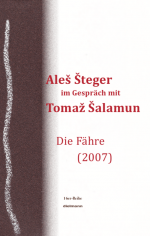
Aleš Šteger talking to famous Tomaz Šalamun
- series 16ers
- hand-stitched
- 48 pages
- translated by Matthias Göritz
- title a sand-emery by Joši Bojz
- a volume in our
- BOX—the wild Slovenes
- at Slovenia as Guest of Honour 2023
978-3-86638-404-0

In 2007, the author, translator and publisher Aleš Šteger, born in Ptuj in 1973, and Tomaž Šalamun, born in Zagreb in 1941, who grew up in Koper and become one of the most important Slovenian poets, spoke to each other about their poetry and literary aesthetics.
The two exchange about the encounter with language, the understanding of poetic worlds and the place of poetry in the world, may be read as an extraordinarily rare moment of happiness. Because the moment of this conversation is savoured with the greatest possible openness and at the same time with unflinching precision and unfolds into numerous historical, social, poetological and personal dimensions.
Aleš: I have always envied you this ability to approach the word like a ready-made, or so it seemed to me. As if you were a big hand reaching into space, lifting something up and turning it over.
Tomaz: I find that hard to imagine, hard to understand. For me it's more as if a rift opens up or a tone, a tension that ruptures, and it's as if a ray then lights up or a sentence bursts forth. Like little horses galloping off together, dashing through it. I write it down quickly and then it's there - or sometimes I just can't and it disappears. I recognise the opening and the sentences for what they are and I have nothing to do with it. That's great.
Aleš: I find that difficult to imagine, difficult to understand. For me, it's more as if a rift opens up or a tone, a tension that breaks, and it's as if a ray then lights up or a sentence bursts forth. Like little horses galloping off together, hurtling through it. I write it down quickly and then it's there—or sometimes I just can't and it disappears. I recognise the opening and the sentences for what they are and I have nothing to do with it. That's great.
Tomaz: That's exactly what I'm talking about. This liberation of the river from the channel in which it flows. The freedom of the river. I don't even know if I am free or not. At a certain point I am a recipient of freedom. Sometimes I am simply speechless. Today your three pages of poetry were like fuel.
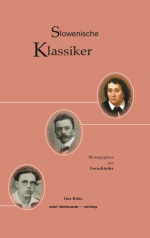
Slovenian Classics
- series 16ers
- hand-stitched
- 48 pages
- selected by Erwin Köstler
- a volume from our
- BOX—the wild Slovens
- at Slovenia as Guest of Honour 2023
978-3-86638-403-3

»Slovenian Classics« we call nine authors—the little volume of our 16-volume series is intended for browsing and as a stimulus for those readers who may not yet have made any acquaintance with "classics" of Slovenian literature.
It is completely unsystematically assembled and, because it is based exclusively on existing translations, highly incomplete. But it does tell us something about a literature that since the Reformation, whether in Slovene or German, has championed its cause and prepared the ground for further development.
Until the 1980s, attempts to make Slovene texts known nationwide were still limited to the initiative of individuals, and they almost all remained marginal and without more lasting effect.
Much has happened since then. Today, Slovenian literature no longer has to prove its right to exist; its great wealth of forms and literary approaches is visible to everyone in a multitude of translations.
Contents
Primož Trubar: Proverb
Johann Weichard Valvasor: The honour of the Duchy Krain
Urban Jarnik: Hints about Carinthia's Germanisation
France Prešeren: About our beautiful Vida
Ivan Cankar: Scetches
Zofka Kveder: Their Lifes
Ivan Pregelj: Plebanus Joannes
rečko Kosovel: Integrals
Vitomil Zupan: Journey to the End of Spring
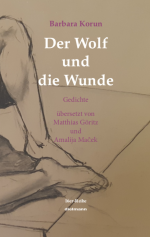
The Wolfe and the Wound (Der Wolf und die Wunde)
poems
- series 16ers
- hand-stitched
- 44 pages
- translated by Amalija Maček and Matthias Göritz
- title drawing by Klara Maček, Ljubljana
- a volume from our
- BOX—the wild Slovenes
- at Slovenia as Guest of Honour 2023
978-3-86638-402-6

Barbara Korun's poems are full of biting mockery of the conventions of bureaucratic language, whether at border crossings or in the ubiquitous shop talk at poetry festivals.
Her poetry runs deep when it comes to female desire, the body and the strange transformation into the animalistic that we all undergo when we love. Korun's lyrics are driven by wild rhythms and constant transgression. Strangely tender and yet sometimes clearly brutal, they tear down images of men, play with the conventions of gender-assessoires and question gender roles.
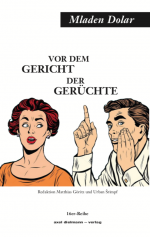
In Front of Court of Rumours
An Essay
- series 16ers
- hand-stitched
- 40 pages
- cared for by
- Matthias Göritz and Peter Šrimpf
- a volume in our
- BOX—the wild Slovenes
- at Slovenia as Guest of Honour 2023
978-3-86638-401-9

However unfounded they may be, rumours always leave a stain, and this stain can hardly be removed.
There is a cynical calculation behind it: You know a rumour is not true and there is no proof, but you also know it will stick, no matter how false it is. There is a moment of pleasure in the easily obtained power it gives you—you can brandish rumours with a quasi-knowledge that they will always hit their target without us having to get our hands dirty.
There is a kind of magical thinking in the way rumours work, namely the belief that you can only influence people (and circumstances) with unsubstantiated words. Words can thoroughly taint what they refer to, even if they are completely inaccurate and unjustified; they begin to function as a property of the thing named. Whatever one ascribes to people in rumours becomes their »ghostly« quality, and no amount of argument can undo that slander. One is helplessly at the mercy of the rumour and is »always already« in the defensive position. In the case of rumour, the referential function acts like an unconscious magic power, influencing things with words by mere naming.
There is a long story that bears witness to this indomitable and irresistible power of rumours—here it is told in condensed form!
Rumours, by definition, have no originator, so there is an unspecified »someone« who can never be brought to light and identified. It starts with a word that comes out of nowhere and yet is overwhelming …
That's the way it goes with rumours: They stick. They stick, whether you want them to or not; they leave their traces, which seem to be indelible …
You can't talk without gossiping, from the moment you open your mouth. Gossip usurps the origin, but there is no language without usurpation. [...] The usual function of language, supposedly communication and information, already presupposes the basic attitude of slander and insult. To speak is to speak maliciously, to speak is to gossip and spread rumours, to speak is to slander …






